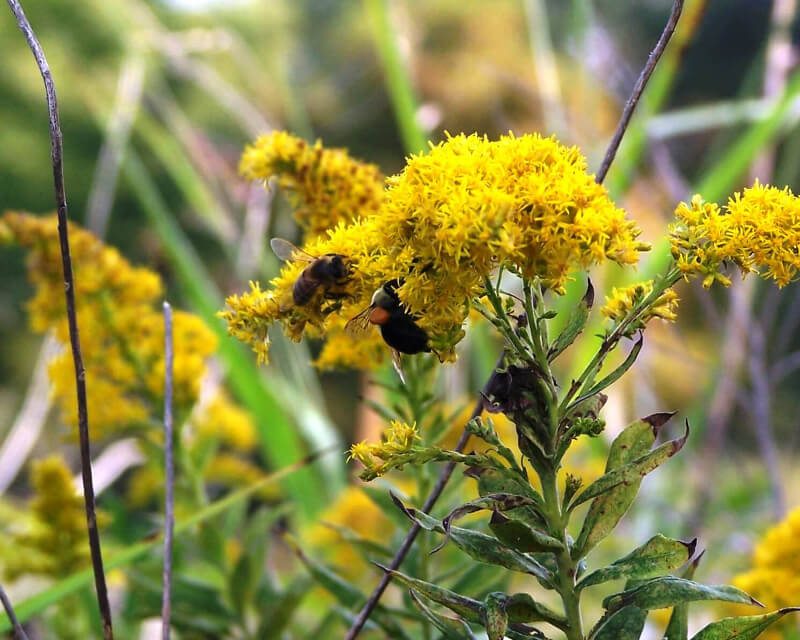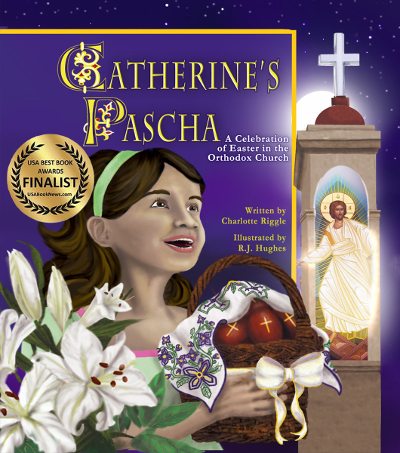One of the things that I love about the Orthodox Church is that we have prayers and blessings for everything. We bless flocks and fields. We bless homes. We bless cars. We bless animals. We bless children. We bless candles. We bless bees.
Sometimes we process out of the church and go to the river or lake or harbor to bless to bless the water.
Sometimes we fill baskets with the things that are to be blessed and bring them to the Church.
We do that at Pascha, of course. But bringing baskets to Church isn’t just a Pascha thing, and it isn’t just a Slavic thing. In the early centuries of the Church, it’s something Christians everywhere did at every major feast.
And it’s something that we still do, sometimes, in some parishes. Especially, perhaps, in August.
Blessing Honey at the Beginning of the Dormition Fast
The Dormition fast runs from the first day of August through the eve of the Feast of the Dormition (known as the Assumption in Western churches). On the first day of the Dormition Fast, it was once the common practice to bring new honey to church to be blessed with these words:
O Lord Jesus Christ, Whose mercies cannot be contained and Whose bounties are ineffable; Who are wondrous in glory and Who works miracles, Who by the operation of the Holy Spirit once blessed Israel and nourished them with honey from a rock: As the same Lord, look down now from above on this Your work, and with Your heavenly blessing bless and consecrate this honeycomb and the honey that comes from it. Grant to it the action of a blessings beyond all perfection, so that all tasting of it, receiving it and eating it, may find good health, and by this nourishment be satisfied and filled with all good things. For You are He Who bestows all good things, and to You we ascribe glory, together with Your Father Who is without beginning, and Your Most-holy, Good and Life-creating Spirit, now and ever and unto ages of ages. Amen.
It’s a lovely thing to save some of the blessed honey to make honey bunnies and other Pascha treats.
Blessing Bees and Beehives
Of course, the Church doesn’t stop with blessing the honey! The Book of Needs also includes prayers for bees and for beehives.

Honeybee and bumblebee share fall goldenrod near Peace Bee Farm, Proctor, Arkansas.
Here’s one of the prayers:
O Almighty and Pre-eternal God: You hold all creation in the palm of your hands; You possess the heavens, the earth and all that is them; You compassionately grant unto all created things that which is beneficial for them. With compunction, we pray to You, O all-good One: As in ancient times You granted the Israelites a land flowing with milk and honey, and as you were well-pleased to nourish Your baptizer John in the wilderness with wild honey, so now by Your good pleasure and caring for our sustenance, bless the beehives in their apiary, greatly increase the number of bees in them, preserve them by Your grace, and fill us rich with honey. Let none of these beehives which You have fashioned be deprived of bees, but let them always be filled with honeycombs of honey. And according to Your great benefits and invincible might, let them be shown undefeated by evils and unshaken by curses. Rather, fenced round about by Your all-powerful might and defended by your armed host, let them always remain unharmed and in Your grasp, O Christ. For Yours it is to be merciful and to save us, O Christ our God, and unto You do we send up glory, honor and worship, together with Your Father and Holy Spirit. Amen.
Blessing Fruit on Transfiguration
The Feast of the Transfiguration is on August 6, about midway through the fast. On the Feast of the Transfiguration, Orthodox people bring baskets filled with fruit to the Church. At the end of the Liturgy, they’re blessed with these words (or perhaps another of the prayers for blessing fruit):
O Lord God Jesus Christ, You said to Your disciples: “Whatever you ask in prayer, believe that you have received it, and it will be yours.” We now humbly beseech You, bless and sanctify these first-fruits which Your faithful servants have brought into Your temple today. Preserve the life and health of all those who partake of them, those who are present here and those who absent. Grant that these blessed first-fruits be an effective medicine for those who are sick and ailing, and a protection against the assaults of the enemy for those who keep them in their homes. May all those who partake of them enjoy the fullness of Your goodness and blessing. For You, O Christ God, are our true nourishment and the Giver of all that is good, and we send up glory to You, together with Your Father, Who is without beginning, and with Your all-holy, good, and live-giving Spirit, now and ever, and to the ages of ages. Amen.
Blessing Flowers and Herbs on Dormition
On the Feast of the Dormition itself, it was long the custom to bring baskets of flowers and herbs to church to be blessed. Their fragrance reminds us of the scent of holiness, which filled the empty tomb of the Theotokos. One of the prayers from the Book of Needs that is sometimes used for this blessing is this:
O Almighty, God from before all ages, by Your word alone You created out of nothingness the heavens, earth, sea and all things visible and invisible. You commanded that the earth bring forth plants and trees to serve both man and animal, each according to its need. In your infinite goodness You ordained that these plants serve not only as food but also as medicine for the sick body. We beseech You, bless this seed, these herbs and these flowers and bestow upon them Your blessing and endow them with Your power. Make them to serve man and animal alike as a defense against all sickness and every defilement, for You are our God, and we send up glory to You, Father, Son and Holy Spirit, now and ever, and to the ages of ages. Amen.
May God grant you the sweetness of his mercy and grace!
Read More
Christmas Eve and Theophany: In my bicalendar parish, Christmas Eve and Theophany fall on the same day.
Why Is Transfiguration in August? Why isn’t it celebrated before Pascha?
St. Irene and the apples of paradise: A sailor brought St. Irene apples from paradise. And to this day, in parts of Greece, people bring apples to church to be blessed on her feastday.
Buy the Books!

These delightfully diverse books provide disability representation (Elizabeth, one of the main characters, is an ambulatory wheelchair user). They also give Orthodox Christian children the rare opportunity to see themselves in books, and children who are not Orthodox the chance to see cultural practices they may not be familiar with.
Catherine’s Pascha
FINALIST IN THE 2015 USA BEST BOOK AWARDS
Catherine doesn’t like vegetables. She doesn’t like naps. She doesn’t like it when her mom combs her hair. She loves hot dogs, chocolate cake, and her best friend, Elizabeth. Most of all, she loves Pascha! Pascha, the Orthodox Christian Easter, is celebrated in the middle of the night, with processions and candles and bells and singing. And Catherine insists that she’s not a bit sleepy.
Celebrate the joy of Pascha through the magic of a book: Catherine’s Pascha. Available on Amazon, Bookshop.org, and my webstore.
The Saint Nicholas Day Snow
Shoes or stockings? Horse or sleigh? Does St. Nicholas visit on December 6 or on Christmas Eve? Will a little girl’s prayer be answered? When Elizabeth has to stay at Catherine’s house, she’s worried about her grandmother, and worried that St. Nicholas won’t find her. The grownups, though, are worried about snow.
Celebrate the wonder of St. Nicholas Day through the magic of a book: The Saint Nicholas Day Snow. Available on Amazon, Bookshop.org, or my webstore.



